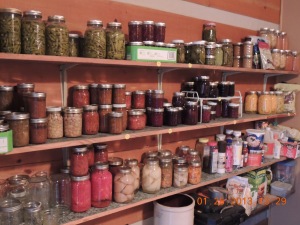
It’s the middle of May and by now New Year’s resolutions are a thing of the distant past. Like diets, New Year’s resolutions sound like a great idea and they actually make you feel better about yourself for a while. This will be the year you really do it. (Lose ten pounds, learn to speak French, stop smoking, etc…….) Then a little slip becomes a little habit and there you are, late at night, standing in front of your refrigerator with the ice cream calling your name. You are only human, after all. I don’t make New Year’s resolutions for this very reason. I make intentions. Intentions give me more wiggle room. I don’t RESOLVE to do something; I merely INTEND to do it. The inevitable failure is softened this way. Each year, come January, I intend to make sure the pantry is empty and the freezer cleared out before next June when the vegetables start coming in. This is no small intention. My husband and I live alone, and while we are big eaters, we usually go into the summer months with remnants of last year’s bounty untouched.
I feel intimated when I open the freezer door and realize how much is in there. Green peas from the previous spring. Peaches, tucked away in the deepest corner, collecting freezer burn like cockleburs. Bags of blackberries, raspberries, blueberries. Dried herbs. Garlic scape pesto. A whole unplucked duck? Bags of casserole ready sweet potatoes. Sliced strawberries. Assorted packages of goose flesh. A quiche made with spring onions and fennel. A container of gumbo my husband made last March. And a twelve-pound turkey I had planned on cooking for Christmas until I got excited by a recipe for vegetarian lasagna made with kale and fontina cheese.
Unlike most people in the world, I never wonder if I will eat, only what I will eat. When Tim and I moved to the farm nine years ago, opting out of the suburban lifestyle was one of the motivators. Opting out of what Micheal Pollan calls the Big Food economy was another. Growing our own food isn’t just about avoiding GMOs and industrial fertilizers. It’s about having choices about what we eat. As less and less American soil is devoted to farming, those choices get more precious. President Obama lost me as a fan when he signed into law H.R. 933, an appropriation bill which included the Monsanto Protection Act. A republican senator from Missouri ( headquarters of biotech giant Monsanto) co-authored the portion of the bill with Monsanto execs that protects Monsanto from being sued if any of its GMOS are proven to have caused harm to the millions of consumers who are eating it’s genetically modified foods. The provision also strips the USDA of the power to stop the sale and planting of potentially hazardous genetically engineered crops even if “in the course of its assessment the Department finds that it poses previously unrecognized risks.” (The corn syrup in your Coke is made with Monsanto GMO corn, just so you know).
Due to significant protest and activism on the part of people who are outraged at this free pass to Monsanto, Sen. Jeff Merkley (D-Oregon), plans to introduce an amendment that would repeal the section that protects Monsanto and other Big Ag companies. GMOs don’t scare me nearly as much as the Big Ag companies who can buy the political power to do whatever they want with our food supply. The growing food movement includes seed savers, home gardeners, small farmers; anyone who cares about the quality of the food they eat and the health of the soil that provides it.
More and more of our friends who live in urban or suburban environments are joining CSAs. Like having a small chicken coop in your back yard, being a member of a CSA or shopping at the farmer’s market is trendy. Like driving a hybrid, it’s a statement that you care about the environment, that you’re a conscious person. As another person who cares about the environment, I’m happy about that. But what if all those folks went out into their back yards and planted a garden? Got a little dirt under their fingernails? What if local parks devoted space for communal gardens? What if the “new food economy” were something that more Americans could participate in as a way of life?
I realize how lucky I am to be sitting in the midst of such bounty. Acres of green pasture and leafy woods. Clean air and the sounds of birdsong. And a freezer full of food. This year perhaps we’ll have a big party and cook as much of what’s still left from last year’s harvest. We’ll empty the pantry shelves, throw open the freezer. What we don’t eat will go home with our guests like party favors. Who wants strawberry jam? Lima beans, anyone? How about a duck?